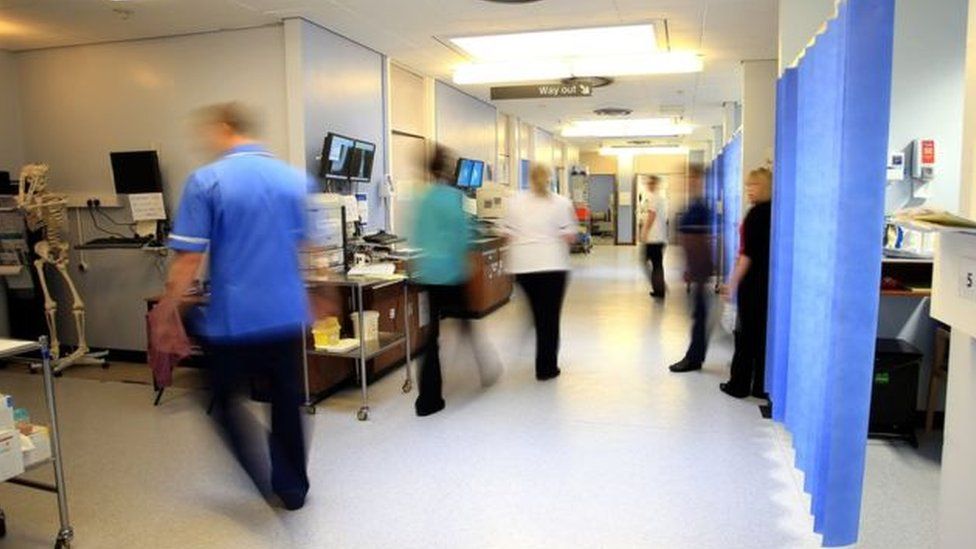
The NHS is under increasing pressure as it marks 75 years since it was founded
By Jenny Rees
BBC Wales health correspondent
The head of the NHS in Wales, Judith Paget, has acknowledged the need for “a rapid increase in the number of staff”, as well as fast-paced change.
She also would not rule out withdrawing care until patients make lifestyle changes to improve their health.
The chief executive said there is a plan to build up numbers “over time” and recent strike action highlighted the need to look after existing staff.
Ms Paget spoke as the service marks its 75th anniversary.
On the issue of withdrawing care due to lifestyles, she said: “If there is good evidence to think about what that looks like I think that is a possibility.
“We know that if people are obese, their ability to respond well to surgical procedures and recover well is compromised. What we want to do is to support people to lose weight before they have their surgical procedure.”
But she was clear that she “would struggle with the concept of refusing people treatment on the basis of some of their lifestyle choices”.
Judith Paget says the NHS has evolved, but further changes are needed
Ms Paget acknowledged the need for the service to change as it faces a growth in demand for services, with referrals alone having gone up 13% in the last year. That is set against a backdrop of about 5,000 vacancies, according to Stats Wales, which also admitted these may be an under-estimate.
She said progress to clear the pandemic’s backlog had been slower than she would like, “but we are getting there,” she insisted.
The waiting list for treatment in Wales currently stands at just over 743,300 – some 582,000 individual patients – with the Welsh government’s goals to reduce the waits still not met.
‘Huge challenges ahead’
“I think we need to change what we do,” she said. “One of the things that we really need to focus on is how we focus on keeping people well: preventing ill health; supporting our patients to make good choices around what they do.”
She pointed to “the huge challenges ahead of us” posed by obesity and diabetes and the need for people to keep themselves well.
The way services are delivered has been changing though, she said.
Ten years ago controversial plans to centralise some specialist services in south Wales were scrapped.
Image source, Getty Images
The service is undergoing low staff morale and patient frustration over access to care
Today a different model is evolving, but with the development of a regional diagnostic hub and centres specialising in orthopaedics and eye surgery all serving patients from several health boards, waiting times have reframed the discussion.
“I think it’s really important to have those conversations with the communities that might be affected by any change, but certainly what we need to do is focus our resources on delivering the best health outcomes for patients.
“What we see at the moment is technology and research pulling us in two directions.
“There is much more that we can do outside hospital in people’s homes; in local community settings; in local doctors’ surgeries, GP surgeries; in other primary care establishments.
“So we’ve got something that’s pulling us this way – to decentralise. And then obviously we have got another pull, which is about the need to centralise our very specialist services more.
Image source, PA Media
NHS architect Aneurin Bevan meets teenager Sylvia Beckingham, who was the first NHS patient being treated at a hospital in Manchester in 1948
“We need to provide opportunities for people to access diagnostics really quickly and the most efficient and effective way of doing that is in larger centres where we centralise things together.”
Given the low staff morale and patient frustration over access to care, is the 75th anniversary of the NHS a moment to celebrate, or take stock?
“I think we should be celebrating the staff of the NHS,” she said.
“They’ve gone through a huge amount over the last few years. They are continuing to be very challenged.
“I think the constant criticism that they feel actually affects their morale as well.
“So I think it’s a time to yes, take stock and reflect. But, actually, I think there is a stronger need to celebrate what the staff are doing in the NHS every day to support us.”








